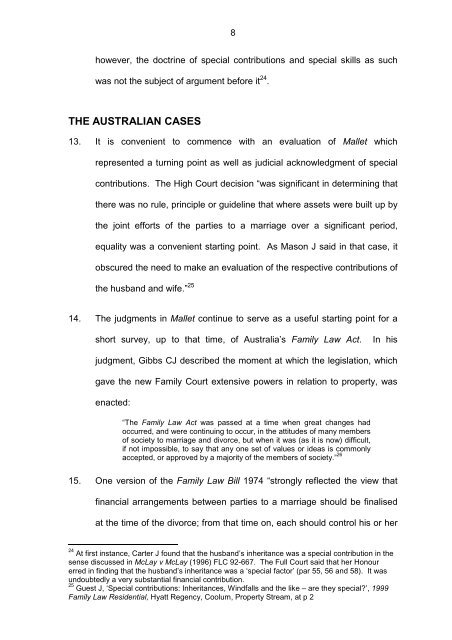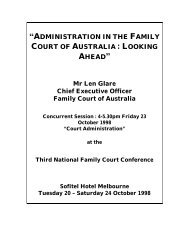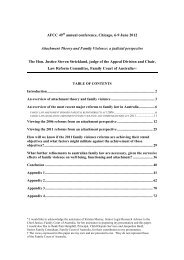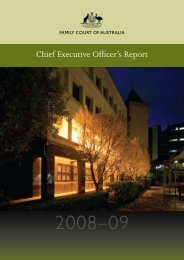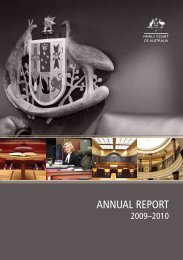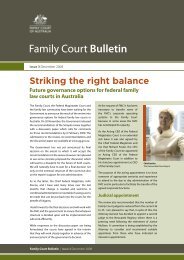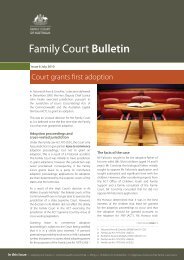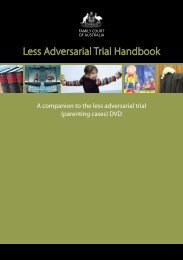never mind the law feel the politics - Family Court of Australia
never mind the law feel the politics - Family Court of Australia
never mind the law feel the politics - Family Court of Australia
- No tags were found...
Create successful ePaper yourself
Turn your PDF publications into a flip-book with our unique Google optimized e-Paper software.
8however, <strong>the</strong> doctrine <strong>of</strong> special contributions and special skills as suchwas not <strong>the</strong> subject <strong>of</strong> argument before it 24 .THE AUSTRALIAN CASES13. It is convenient to commence with an evaluation <strong>of</strong> Mallet whichrepresented a turning point as well as judicial acknowledgment <strong>of</strong> specialcontributions. The High <strong>Court</strong> decision “was significant in determining that<strong>the</strong>re was no rule, principle or guideline that where assets were built up by<strong>the</strong> joint efforts <strong>of</strong> <strong>the</strong> parties to a marriage over a significant period,equality was a convenient starting point. As Mason J said in that case, itobscured <strong>the</strong> need to make an evaluation <strong>of</strong> <strong>the</strong> respective contributions <strong>of</strong><strong>the</strong> husband and wife.” 2514. The judgments in Mallet continue to serve as a useful starting point for ashort survey, up to that time, <strong>of</strong> <strong>Australia</strong>’s <strong>Family</strong> Law Act. In hisjudgment, Gibbs CJ described <strong>the</strong> moment at which <strong>the</strong> legislation, whichgave <strong>the</strong> new <strong>Family</strong> <strong>Court</strong> extensive powers in relation to property, wasenacted:“The <strong>Family</strong> Law Act was passed at a time when great changes hadoccurred, and were continuing to occur, in <strong>the</strong> attitudes <strong>of</strong> many members<strong>of</strong> society to marriage and divorce, but when it was (as it is now) difficult,if not impossible, to say that any one set <strong>of</strong> values or ideas is commonlyaccepted, or approved by a majority <strong>of</strong> <strong>the</strong> members <strong>of</strong> society.” 2615. One version <strong>of</strong> <strong>the</strong> <strong>Family</strong> Law Bill 1974 “strongly reflected <strong>the</strong> view thatfinancial arrangements between parties to a marriage should be finalisedat <strong>the</strong> time <strong>of</strong> <strong>the</strong> divorce; from that time on, each should control his or her24 At first instance, Carter J found that <strong>the</strong> husband’s inheritance was a special contribution in <strong>the</strong>sense discussed in McLay v McLay (1996) FLC 92-667. The Full <strong>Court</strong> said that her Honourerred in finding that <strong>the</strong> husband’s inheritance was a ‘special factor’ (par 55, 56 and 58). It wasundoubtedly a very substantial financial contribution.25 Guest J, ‘Special contributions: Inheritances, Windfalls and <strong>the</strong> like – are <strong>the</strong>y special?’, 1999<strong>Family</strong> Law Residential, Hyatt Regency, Coolum, Property Stream, at p 2


